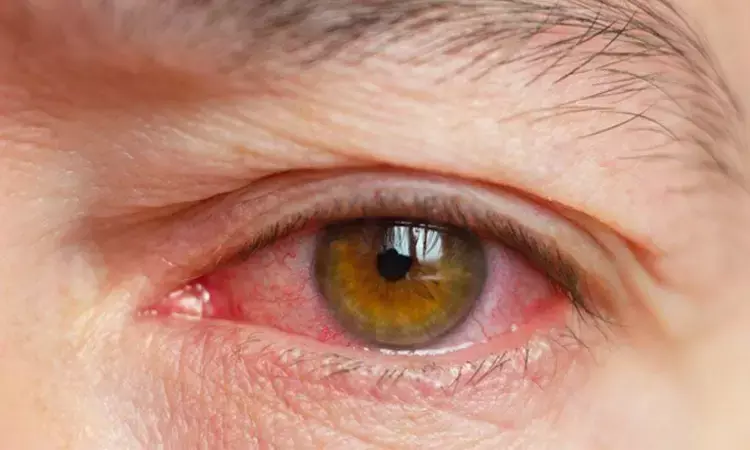- Home
- Medical news & Guidelines
- Anesthesiology
- Cardiology and CTVS
- Critical Care
- Dentistry
- Dermatology
- Diabetes and Endocrinology
- ENT
- Gastroenterology
- Medicine
- Nephrology
- Neurology
- Obstretics-Gynaecology
- Oncology
- Ophthalmology
- Orthopaedics
- Pediatrics-Neonatology
- Psychiatry
- Pulmonology
- Radiology
- Surgery
- Urology
- Laboratory Medicine
- Diet
- Nursing
- Paramedical
- Physiotherapy
- Health news
- Fact Check
- Bone Health Fact Check
- Brain Health Fact Check
- Cancer Related Fact Check
- Child Care Fact Check
- Dental and oral health fact check
- Diabetes and metabolic health fact check
- Diet and Nutrition Fact Check
- Eye and ENT Care Fact Check
- Fitness fact check
- Gut health fact check
- Heart health fact check
- Kidney health fact check
- Medical education fact check
- Men's health fact check
- Respiratory fact check
- Skin and hair care fact check
- Vaccine and Immunization fact check
- Women's health fact check
- AYUSH
- State News
- Andaman and Nicobar Islands
- Andhra Pradesh
- Arunachal Pradesh
- Assam
- Bihar
- Chandigarh
- Chattisgarh
- Dadra and Nagar Haveli
- Daman and Diu
- Delhi
- Goa
- Gujarat
- Haryana
- Himachal Pradesh
- Jammu & Kashmir
- Jharkhand
- Karnataka
- Kerala
- Ladakh
- Lakshadweep
- Madhya Pradesh
- Maharashtra
- Manipur
- Meghalaya
- Mizoram
- Nagaland
- Odisha
- Puducherry
- Punjab
- Rajasthan
- Sikkim
- Tamil Nadu
- Telangana
- Tripura
- Uttar Pradesh
- Uttrakhand
- West Bengal
- Medical Education
- Industry
TearCare Significantly Improves QoL and Visual Function in Dry Eye Disease Patients: Study

Researchers have found out that the treatment of TearCare (TC) may improve clinical outcome measures as well as improve quality of life in patients experiencing dry eye disease (DED) and meibomian gland disease (MGD). A recent study was published in the journal Clinical Ophthalmology conducted by Feng Y. and colleagues.
This study included adults diagnosed with MGD and DED. 32 individuals, with an average age of 55.9 years, had a minimum visual acuity of 20/40 and hadn't received any surgical or new DED treatment during the past 60 days. Baseline and after one month of receiving TC, the participants were studied on various parameters, that included MGSS, TBUT, and KFL. Self-reported symptoms were evaluated by the Ocular Surface Disease Index (OSDI) and the Visual Function Questionnaire-25 (VFQ-25), functional visual measures that included reading speed, measured with International Reading Speed Texts (IReST), Minnesota Low Vision Reading Test (MNREAD), and Wilkins Rate of Reading Test (WRRT).
• 52% (16 participants) demonstrated a clinically significant improvement in reading speed, defined as an increase of at least 10 words per minute in IReST score. Both the IReST and MNREAD reading tests were statistically significant (p = 0.012 and p = 0.028, respectively).
• Quality of life improved significantly, OSDI scores decreased significantly and VFQ-25 increased (both p < 0.001), indicating a decrease in self-reported symptoms and increased perception of visual function.
• All the clinical parameters, including MGSS, TBUT, and KFL, were statistically improved after TC treatment at p < 0.001, which shows that TC is effective in restoring the meibomian gland function and stability of tear film.
In conclusion, TearCare has demonstrated clinical and functional benefits in patients suffering from DED who present with MGD. Its efficacy after one session of therapy makes it an ideal frequent therapy for the DED patient, particularly one who is significantly challenged by functional visual impediments.
Reference:
Dr Riya Dave has completed dentistry from Gujarat University in 2022. She is a dentist and accomplished medical and scientific writer known for her commitment to bridging the gap between clinical expertise and accessible healthcare information. She has been actively involved in writing blogs related to health and wellness.
Dr Kamal Kant Kohli-MBBS, DTCD- a chest specialist with more than 30 years of practice and a flair for writing clinical articles, Dr Kamal Kant Kohli joined Medical Dialogues as a Chief Editor of Medical News. Besides writing articles, as an editor, he proofreads and verifies all the medical content published on Medical Dialogues including those coming from journals, studies,medical conferences,guidelines etc. Email: drkohli@medicaldialogues.in. Contact no. 011-43720751


